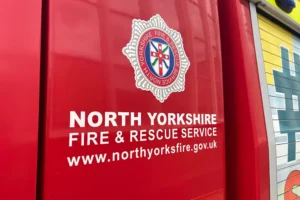York Theatre Royal and Riding Lights Theatre take a meaningful step closer to home – geographically and thematically, with their thought-provoking and ambitious production His Last Report.
Exploring the social reform and legacy of Seebohm Rowntree, this bi-annual community offering gives a glimpse into a story rarely told but still undeniably relevant.
This narrative follows Rowntree’s journey far beyond his well-known ties to the world of chocolate, casting himself as the social reformer, fighting the structural oppression of his time. A bold choice for a community-led piece of this magnitude, with a desire to inspire reflection rather than just simply entertain.
His Last Report is at York Theatre Royal from Saturday 19 July to Sunday 3 August.

This production finds its greatest strength through its undeniable collaboration and depth of community spirit. With over 250 volunteers involved both off-and-on the stage there is a genuine sense of collective purpose, and this shared effort enables moments of authenticity and unity that are difficult to manufacture.
Professional actors Antony Jardine and Amelia Donkor lead the ensemble with conviction. Jardine as Rowntree leads the charge with a series of introspective monologues outlining his desire for social change. Whilst initially powerful, these speeches did become somewhat repetitive as they lingered on thematic repetition, a wealthy man narrating the plight of the poor with very few representations did create some disconnect.
Message over momentum from scriptwriters Bridget Foreman and Misha Duncan-Barry meant this desire for change sometimes felt static and unrepresented. The result is a well-meaning but occasionally distant portrayal of poverty and reform.
Nevertheless, the wider cast of volunteers added welcome energy and variety. Notable portrayals include Colin Beveridge as a recognisable Winston Churchill and Andrew Wrenn as an ambitious David Lloyd George, whilst Rosy Rowley offered tenderness and quiet strength as May Kendall, Rowntree’s poetic confidante. Each supporting character added texture, guiding the audience through key moments of Rowntree’s personal and political life.
Visually, the production shines. Hazel Fall and her dedicated wardrobe volunteers evoke the period with care and flair, transporting us convincingly between eras. Sara Perks’ striking set, dominated by a steel balcony and tall factory windows, served as a constant reminder of Rowntree’s industrial roots. The clever staging and utilisation under Juliet Forster and Paul Birch’s direction used two levels, which helped to later represent the difference in eras laid before us, acting as that poverty line Seebohm identifies so hopefully.

A highlight comes at the end of act one, where music, movement, and design align to create a genuinely uplifting moment of hope – a welcome contrast to the otherwise heavy tone. Act two takes a more abstract beginning, placing us in a present-day rehearsal room as the creative team discusses Rowntree’s legacy, offering jigsaw pieces to Seebohm himself. It’s an intriguing and divisive creative decision, which once again acts as a window into modern day’s harsh reality and relatability.
Throughout this complex piece, the choir remains the heartbeat. They provided a hauntingly beautiful backdrop, with not only their songs supplying stunning crescendos at pivotal plot points but also being the underbelly and soundtrack of each moment. Their harmonies weave through scenes with poignant beauty, underscoring everything from the rhythmic churn of factory life to the quiet ache of social injustice. They don’t just support the action, they enhance it and remained just as impactful as the talented cast onstage.
Foreman and Duncan-Barry care deeply about their subject, as did Rowntree in his time. His Last Report raises vital questions about the past and present, even if it doesn’t always clearly answer them. It’s a production built on passion and purpose. And as community theatre so often does, it serves its purpose well: to bring people together, tell stories that matter, and spark conversations that continue long after the curtain falls.
Tickets are still available, for those who want to support this enormous theatrical undertaking, with community at its core. His Last Report is at York Theatre Royal until Sunday 3 August. Tickets start from £15 and are available here.












